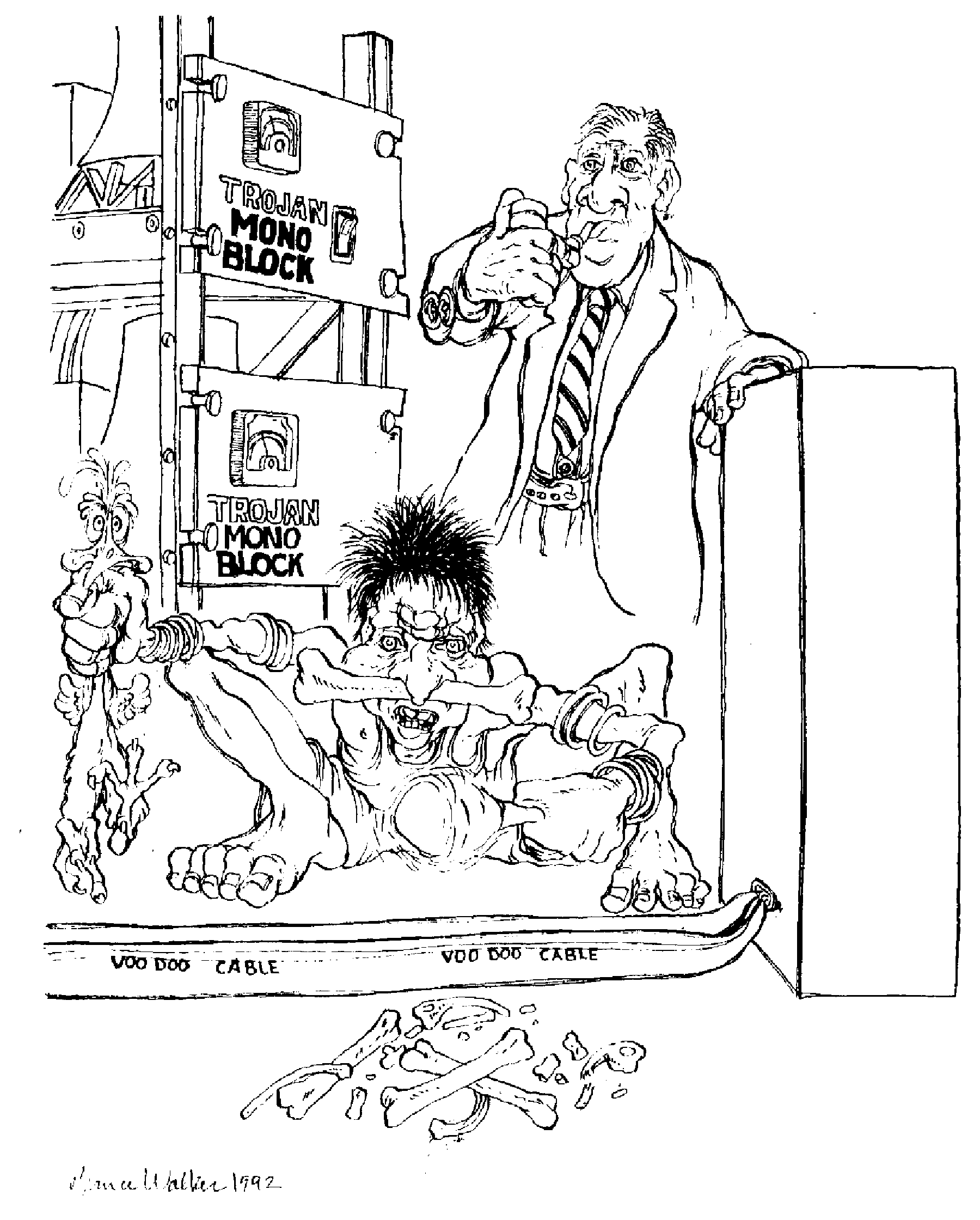Roger Skoff picks up the cry for a new HiFi Industry Association
Do you remember electric trains? Practically every family who had kids owned one. Even adults loved them, and they could be bought almost everywhere, including toy shops, hobby shops, department stores, and even some "dime" stores. At Christmas time, there was hardly a Christmas tree anywhere that didn't have an electric train circling its base. Now—at least the last time that I checked—there were just a dozen or so electric train dealers in the entire United States, and they were doing very well indeed, thank you. They were serving the needs of just a very few, either very wealthy or very committed Electric Train Crazies, who were enough to keep those few stores successfully in business, but certainly weren't enough to allow any new dealers to enter the market.
I fear the same for our hobby and industry.
When movies first came out with stereophonic sound they wowed the public, and when, in the late 1950s, the first stereo LPs came out, the public ran to buy them and Hi-Fi, all of a sudden, went from the hobby of just a few enthusiasts to a major pastime of the general public. There was a second great boom in the hobby and industry following the advent of the CD in 1982, but that was more than forty years ago, and our hobby is coming to resemble the electric train biz more and more, every day.
Not too many years ago, I went to the Toronto HiFi Show and, as I passed through customs to enter Canada, the Customs Agent, a young woman in her early twenties, asked me the purpose of my visit. I told her that I was going to a HiFi Show. She had no idea at all what I was talking about. She didn't know what HiFi was; only sort of recognized the word "stereo;" and wouldn't let me pass until I explained that I was going to a trade show for the electronics industry. That she understood, and in her complete unawareness of even our existence, she is nothing like alone.
I've been hearing for many years, now, that "Something ought to be done" to revitalize our hobby and to make our hobby and our industry appealing to something more than just the very occasional female audiophile and the ever-older majority of men seen in HiFi shops and at HiFi Shows.
The lack of female interest was first proven in the 1990s, when Stereophile did a study and found that only one percent (or likely, even less) of its total readership was women. And, even earlier, (I can't check the date because it was so successful that there's not even any listing for it on Google), The Academy for the Advancement of High-End Audio (AAHEA) was formed to try to restore the hobby's already sagging popularity—even after its great boom with the advent of CDs just a dozen years before.
AAHEA was an "industry association," well-meaning, but ineffectual.(I was all in favor of it—both for its potential benefit to the industry, and because two of my company's products were nominated for its top award.) Unfortunately, few companies joined it, and it became little more than a social club for a select group of industry friends. As to the industry advertising it was supposed to do to support High-End Audio, there was little of it, run in high-end audio magazines, where its members could look to see it and pat themselves on the back, instead of in media catering to the general public, where it could do some good.
Now there's talk again of starting another industry association. I'm all in favor of it, too, but doubt that it will ever happen. And what's worse, I think that, even if it does get formed, it will also be doomed to total failure.
The basic problem with our hobby and our industry is that very few people know of us or take us seriously. To the average person, we either don't exist or are a bunch of HiFi Crazies (my friends and I call ourselves that, but with a different connotation, entirely), throwing money at wildly expensive gear that nobody cares about (or couldn't hear the difference between), anyway. As I've said before, if a guy buys a Ferrari for $300,000, everybody thinks he's crazy, but wishes they were him. With HiFi, if somebody pays one-third that much for a system, everybody just thinks he's crazy.
What we need is for people to understand that good sound is part of good living, and that, while it can be, it doesn't have to be expensive. Unfortunately, the public's lack of understanding of that has already worked to make it less true: Most of what we used to condescendingly look down on as "mid-fi" companies—the companies that produced the HiFi products that "every-day people" bought—have already either gone out of business or gone into other things, and it's our loss. They were an important source of potential new audiophiles and of the new technologies that could draw them in. (Remember that it was Sony and Phillips who developed both the CD and the SACD/DSD, and that most of the other advanced technologies that our small companies improve on were also first created by major firms.)
It was also the major firms that did the only advertising for consumer electronics products that the average person was ever likely to see. And it's advertising that's what we need to get our hobby and our industry known to the public. Product placements in movies and on television and all sorts of other things could be used to make us known, too, but they all have to be paid for, and who's going to do it?
The obvious answer is a trade association, but where's it going to get the money?
"Aha," you say, "from the dues of its members or from assessments laid upon them by the association."
Nope, not a chance.
Let me tell you about what happened to my company some years ago, in China. We had two very major Chinese distribution firms that both wanted to distribute our products in that potentially huge market. Both companies were very large and very successful, and both wanted their distribution rights to be exclusive. Obviously, that couldn't happen, so what I told them was that both could sell anywhere in China that they wanted to for one year, and at the end of that year, the company that had the highest sales would be granted the entire country as its exclusive territory.
Wanna guess what happened? Nothing. Company "A" didn't want to advertise for fear of benefitting Company "B," and Company "B" didn't want to advertise for fear of benefitting Company "A," so neither of them advertised, and neither made sales. A trade association has to advertise not any specific product or company, but its entire industry. That means everybody. So, what happens with most trade associations? The association—if it's a good one—advertises for the entire industry and a significant number of potential members never join. Why should they? If they join, they're going to have to pay money toward the association's advertising budget, but if they don't join, because the association is advertising for them anyway, they get whatever benefits are to be had for free!
Do you remember "Got milk?" That was a very successful advertising program put together by the California Milk Board, a state association for dairymen. Somehow, they got virtually every California milk producer to pay for it, and it worked. Could a HiFi industry association do the same thing? I doubt it.
It might be possible to get most of the manufacturers in our industry to join an association, and contribute to the common good, if all of the HiFi dealers had an association and would refuse to buy any product not produced by a Manufacturer's Association member. That might work, and it would benefit everyone. The Manufacturer's Association would have lots of members, so it would have lots of money to buy lots of advertising, which would, hopefully, produce lots of new customers, who would buy lots of HiFi gear, which would make both the manufacturers and the dealers happy. Everybody would win: The customers would have new toys and maybe a new hobby; the manufacturers and dealers would do great new business; and it might even make for more music being produced for everyone to enjoy.
How's it going to happen, though? Who's going to start the Dealers' Association? Using what as bait? And without a Dealers' Association to refuse to buy their products, how's anybody going to get manufacturers and distributors to pay to join an association whose benefits they can coat-tail on for free? And without lots of members, where's an Association going to get the budget to promote our industry and get new people to buy and enjoy its products?
I don't know. You tell me.
Please.








































